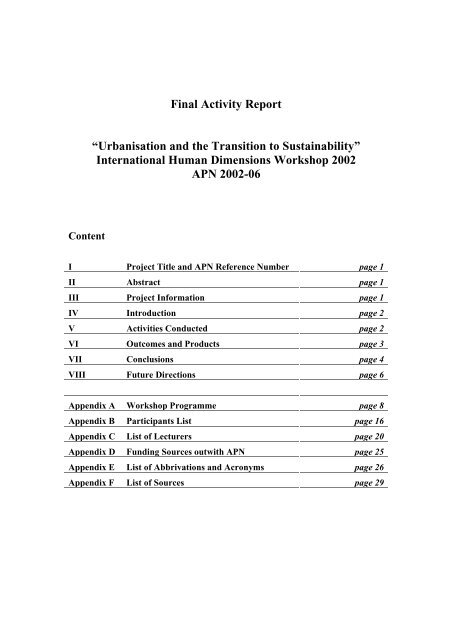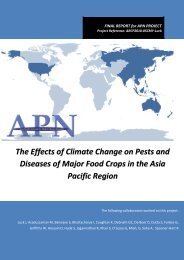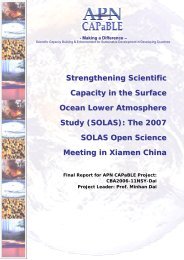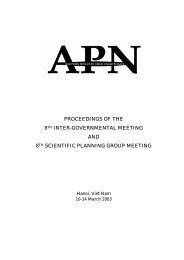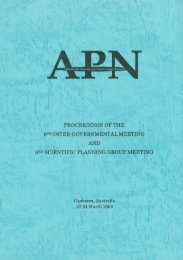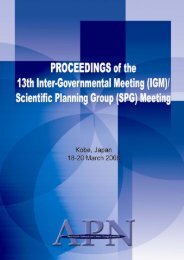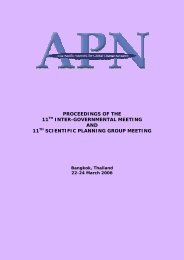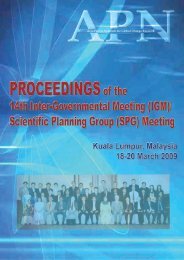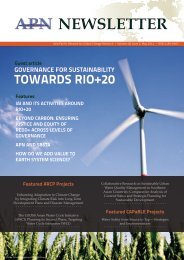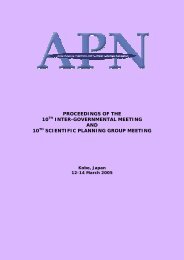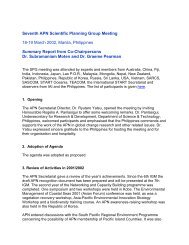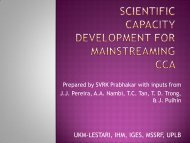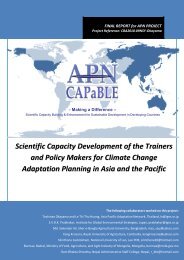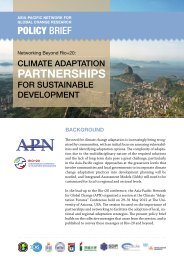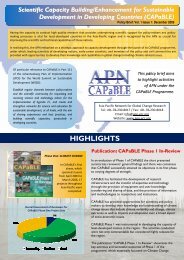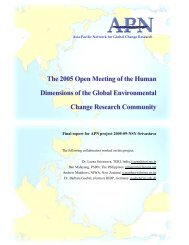Final Activity Report “Urbanisation and the Transition to Sustainabilityâ€
Final Activity Report “Urbanisation and the Transition to Sustainabilityâ€
Final Activity Report “Urbanisation and the Transition to Sustainabilityâ€
Create successful ePaper yourself
Turn your PDF publications into a flip-book with our unique Google optimized e-Paper software.
Content<br />
<strong>Final</strong> <strong>Activity</strong> <strong>Report</strong><br />
“Urbanisation <strong>and</strong> <strong>the</strong> <strong>Transition</strong> <strong>to</strong> Sustainability”<br />
International Human Dimensions Workshop 2002<br />
APN 2002-06<br />
I Project Title <strong>and</strong> APN Reference Number page 1<br />
II Abstract page 1<br />
III Project Information page 1<br />
IV Introduction page 2<br />
V Activities Conducted page 2<br />
VI Outcomes <strong>and</strong> Products page 3<br />
VII Conclusions page 4<br />
VIII Future Directions page 6<br />
Appendix A Workshop Programme page 8<br />
Appendix B Participants List page 16<br />
Appendix C List of Lecturers page 20<br />
Appendix D Funding Sources outwith APN page 25<br />
Appendix E List of Abbrivations <strong>and</strong> Acronyms page 26<br />
Appendix F List of Sources page 29
<strong>Final</strong> <strong>Activity</strong> <strong>Report</strong> for APN Project<br />
I Project Title <strong>and</strong> APN Reference Number<br />
International Human Dimensions Workshop 2002 – Urbanisation <strong>and</strong> <strong>the</strong><br />
<strong>Transition</strong> <strong>to</strong> Sustainability (APN 2002-06)<br />
II Abstract<br />
The IHDP wants <strong>to</strong> provide opportunities for a new generation of young<br />
human <strong>and</strong> social science scholars, as well as scholars trained in<br />
interdisciplinary research <strong>and</strong> those who can bridge <strong>the</strong> natural <strong>and</strong> social<br />
sciences, especially from <strong>the</strong> developing countries, <strong>to</strong> enhance <strong>the</strong>ir capacity <strong>to</strong><br />
deal with – <strong>and</strong> <strong>to</strong> achieve greater access <strong>to</strong> – <strong>the</strong> field of Global<br />
Environmental Change research. These scholars need a forum in which <strong>to</strong><br />
discuss how <strong>the</strong>y are addressing <strong>the</strong> challenges of doing interdisciplinary<br />
research on <strong>the</strong> human dimensions of global environmental change. From June<br />
2-15,2002 IHDP <strong>and</strong> START hosted <strong>the</strong> third bi-annual International Human<br />
Dimensions Workshop (IHDW) for young scientists <strong>to</strong> explore <strong>the</strong> workshop<br />
<strong>the</strong>me: “Urbanisation <strong>and</strong> <strong>the</strong> <strong>Transition</strong> <strong>to</strong> Sustainability.”<br />
The main objective of <strong>the</strong> workshop was <strong>to</strong> provide a comprehensive <strong>and</strong><br />
integrated perspective on issues related <strong>to</strong> Global Environmental Change in<br />
urban areas. The workshop encouraged <strong>the</strong> speakers <strong>and</strong> participants from<br />
different scientific backgrounds <strong>to</strong> develop an interdisciplinary approach <strong>to</strong><br />
<strong>the</strong> workshop <strong>the</strong>me. Different complementary components, such as lectures,<br />
expert panels <strong>and</strong> individual projects formed <strong>the</strong> basis of <strong>the</strong> organisational<br />
structure of <strong>the</strong> workshop. The lectures <strong>and</strong> panels given by well-known<br />
scholars in <strong>the</strong> field exposed <strong>the</strong> participants <strong>to</strong> a wide range of <strong>to</strong>pics<br />
reflecting <strong>the</strong> complex <strong>and</strong> dynamic range of societal <strong>and</strong> environmental<br />
interactions that take place in cities.<br />
III Project Information<br />
Project Leader: Dr. Yoshiki Yamagata,<br />
National Institute for Environmental Studies<br />
Japan Environmental Agency, 16-2 Onogawa, Tsukuba<br />
Ibaraki 305-0053, Japan<br />
Tel: +81 298 50 2545, Fax: +81 298 50 2572<br />
Email: yamagata@nies.go.jp<br />
APN Funding: 25.000 USD<br />
Participating Countries, funded by APN:<br />
India, China, Malaysia, Indonesia, Japan, Australia
IV Introduction<br />
IHDP's programme is designed around its three main objectives of research,<br />
research capacity building <strong>and</strong> international scientific networks. The proposed<br />
workshop would contribute <strong>to</strong> <strong>the</strong>se three objectives.<br />
Global change issues will remain high on both <strong>the</strong> science <strong>and</strong> political<br />
agendas of <strong>the</strong> 21st century. Appropriate assessment of <strong>the</strong>se issues cannot<br />
occur without a greater involvement by <strong>the</strong> human <strong>and</strong> social science<br />
communities than has been evident <strong>to</strong> date. We need <strong>to</strong> provide opportunities<br />
for a new generation of young human <strong>and</strong> social science scholars, especially<br />
from <strong>the</strong> developing countries <strong>and</strong> countries in transition as well as Russia <strong>to</strong><br />
enhance <strong>the</strong>ir capacity <strong>to</strong> deal with--<strong>and</strong> <strong>to</strong> achieve greater access <strong>to</strong> -- this<br />
exciting field. The IHDP Secretariat in Bonn puts high priority on research<br />
capacity building.<br />
Urbanisation is one of <strong>the</strong> trends in human-environment interactions that<br />
st<strong>and</strong> out as we look <strong>to</strong> <strong>the</strong> coming decades. The 21 st century is <strong>the</strong> first in<br />
which more people will reside in urban than in rural areas. The urban<br />
population grows at a much faster rate than <strong>the</strong> <strong>to</strong>tal population. For <strong>the</strong><br />
coming decades, <strong>the</strong> predicted increase is 80 million new city dwellers every<br />
year. 1 Most of <strong>the</strong>se people will live in cities of developing countries.<br />
Urbanisation <strong>and</strong> urban life can be linked <strong>to</strong> GEC in several ways, all of<br />
which will be explored during <strong>the</strong> workshop. It is clear that cities as “hot<br />
spots” of globalisation <strong>and</strong> driving forces for GEC constitute a crucial<br />
challenge for both local <strong>and</strong> global sustainability.<br />
Despite <strong>the</strong> fact that urbanisation <strong>and</strong> mega cities will determine much of <strong>the</strong><br />
future relationship between <strong>the</strong> environment <strong>and</strong> humans, <strong>the</strong>re has not been a<br />
concerted effort in bringing <strong>to</strong>ge<strong>the</strong>r national <strong>and</strong> international ongoing<br />
research activities. With producing a Scoping <strong>Report</strong> on “Urbanisation <strong>and</strong><br />
<strong>the</strong> <strong>Transition</strong> <strong>to</strong> Sustainability” IHDP would first of all highlight <strong>the</strong><br />
importance of <strong>the</strong> issue, which has not been a priority issue so far in <strong>the</strong> IHDP<br />
community. Secondly, it will link <strong>the</strong> IHDP core projects, which all <strong>to</strong>uch<br />
upon <strong>the</strong> issue in <strong>the</strong>ir Science Plans, but have not been addressing <strong>the</strong> issue<br />
collectively. In bringing <strong>to</strong>ge<strong>the</strong>r several institutions, projects <strong>and</strong><br />
programmes already dealing with GEC <strong>and</strong> urbanisation, an international<br />
collaboration would be stimulated with <strong>the</strong> longer term perspective of<br />
fostering a new research project. Bringing young scholars in<strong>to</strong> <strong>the</strong> process<br />
will support <strong>the</strong> possibility that this important issue will be taken up<br />
internationally by <strong>the</strong> next generation of scientists.<br />
V Activities Conducted<br />
The main objective of <strong>the</strong> workshop was <strong>to</strong> provide a comprehensive <strong>and</strong><br />
integrated perspective on issues related <strong>to</strong> Global Environmental Change in<br />
urban areas. The workshop encouraged <strong>the</strong> speakers <strong>and</strong> participants from<br />
different scientific backgrounds <strong>to</strong> develop an interdisciplinary approach <strong>to</strong><br />
<strong>the</strong> workshop <strong>the</strong>me. Different complementary components, such as lectures,<br />
1 National Research Council (1999): “Our Common Journey – A <strong>Transition</strong> <strong>to</strong>ward Sustainability.” Washing<strong>to</strong>n<br />
D.C.<br />
2
expert panels <strong>and</strong> individual projects formed <strong>the</strong> basis of <strong>the</strong> organisational<br />
structure of <strong>the</strong> workshop. The lectures <strong>and</strong> panels given by well-known<br />
scholars in <strong>the</strong> field exposed <strong>the</strong> participants <strong>to</strong> a wide range of <strong>to</strong>pics<br />
reflecting <strong>the</strong> complex <strong>and</strong> dynamic range of societal <strong>and</strong> environmental<br />
interactions that take place in cities, from <strong>the</strong> local <strong>to</strong> <strong>the</strong> global level: natural<br />
<strong>and</strong> social dimensions of GEC, regional processes of urbanisation, urban<br />
processes, social shaping of urban space, governance, environmental<br />
problems, urban climate, vulnerability, <strong>and</strong> water.<br />
The last two days of <strong>the</strong> workshop were dedicated <strong>to</strong> <strong>the</strong> presentations of <strong>the</strong><br />
participants. Weeks before <strong>the</strong> start of <strong>the</strong> workshop <strong>the</strong> participants were<br />
asked <strong>to</strong> select an individual case study from <strong>the</strong>ir country on a <strong>to</strong>pic related<br />
<strong>to</strong> <strong>the</strong> Human Dimensions of Global Environmental Change in cities. Having<br />
brought <strong>the</strong>ir own empirical data sets <strong>to</strong> <strong>the</strong> workshop, <strong>the</strong> participants had <strong>the</strong><br />
chance <strong>to</strong> apply <strong>the</strong> information <strong>and</strong> knowledge ga<strong>the</strong>red from <strong>the</strong> workshop<br />
directly <strong>to</strong> <strong>the</strong>ir own individual projects. The majority of <strong>the</strong> presentations at<br />
<strong>the</strong> end of <strong>the</strong> workshop demonstrated a clear step <strong>to</strong>wards an integrated<br />
perspective of human dimensions of Global Environmental Change. The<br />
majority of <strong>the</strong> participants expressed a strong desire <strong>to</strong> exp<strong>and</strong> <strong>the</strong>ir research<br />
<strong>to</strong> include new dimensions.<br />
This successful outcome was <strong>the</strong> result of a framework that put a lot of<br />
emphasis on communication <strong>and</strong> interaction amongst <strong>the</strong> present scholars. All<br />
invited lecturers were asked <strong>to</strong> stay for some extra time <strong>to</strong> give sufficient<br />
room for interaction <strong>and</strong> discussions. The scholars advised <strong>and</strong> commented on<br />
<strong>the</strong> individual case studies of <strong>the</strong> participants. Additionally two data specialist<br />
from CIESIN <strong>and</strong> <strong>the</strong> Center for Environmental Systems Research were<br />
present during <strong>the</strong> major time of <strong>the</strong> workshop. After giving an introduction<br />
on Arc View <strong>and</strong> GIS <strong>the</strong>y assisted with individual data problems <strong>and</strong><br />
computer questions of <strong>the</strong> participants. Lively discussions in <strong>the</strong> breaks,<br />
during <strong>the</strong> evenings <strong>and</strong> even in <strong>the</strong> nights, when participants <strong>and</strong> speakers<br />
were working <strong>to</strong>ge<strong>the</strong>r in <strong>the</strong> computer room, proved <strong>the</strong> organisational<br />
framework <strong>to</strong> work successfully.<br />
VI Outcomes <strong>and</strong> Products<br />
One important result of <strong>the</strong> workshop is <strong>the</strong> construction of a strong network<br />
of young <strong>and</strong> senior scholars working in <strong>the</strong> field of GEC <strong>and</strong> urbanisation. A<br />
list server has been installed in <strong>the</strong> meanwhile <strong>to</strong> facilitate <strong>the</strong> communication<br />
within <strong>the</strong> group.<br />
The workshop homepage (http://www.ihdp.uni-bonn.de/ihdw02/ihdw02.html)<br />
offers information on <strong>the</strong> content of <strong>the</strong> workshop, e.g. <strong>the</strong> workshop agenda<br />
with links <strong>to</strong> <strong>the</strong> presentation of participants <strong>and</strong> speakers, summaries of<br />
participants case studies, participants list, speakers list, <strong>and</strong> links <strong>to</strong> o<strong>the</strong>r<br />
WebPages related <strong>to</strong> Urbanisation <strong>and</strong> GEC. A hard copy report of <strong>the</strong><br />
workshop, which will concentrate on <strong>the</strong> case studies of <strong>the</strong> participants, is<br />
foreseen <strong>to</strong> be published by March 2003. IHDP actively engages <strong>the</strong><br />
workshop participants <strong>to</strong> apply for <strong>the</strong> Human Dimensions Open Meeting in<br />
Montreal (Oc<strong>to</strong>ber 16-18, 2003) with <strong>the</strong> aim, <strong>to</strong> organize a follow up meeting.<br />
3
There is a call for <strong>the</strong> best case study among <strong>the</strong> participants of <strong>the</strong> IHDW<br />
2002. The two best papers will be selected <strong>to</strong> participate in a panel of <strong>the</strong><br />
IHDP urbanisation scoping team at <strong>the</strong> Open Science Meeting.<br />
Some Participants are interested in acting as contact points for national HD<br />
communities in <strong>the</strong>ir countries, aiming at fur<strong>the</strong>r developing of already<br />
existing, or establishing new national committees. IHDP’ s already successful<br />
Seed Grant Initiative was suggested as a mechanism <strong>to</strong> assist in this.<br />
<strong>Final</strong>ly IHDP offers partnerships for future proposal writing <strong>to</strong> <strong>the</strong> participants<br />
of <strong>the</strong> IHDW 2002, i.e. that we connect <strong>the</strong>m with senior scientists, which are<br />
willing <strong>to</strong> assist in <strong>the</strong> process of drafting proposals.<br />
VII Conclusions<br />
Cities are complex <strong>and</strong> dynamic systems, which reflect <strong>the</strong> interactions<br />
between socioeconomic <strong>and</strong> ecological aspects at local <strong>and</strong> global levels.<br />
More than 90% of <strong>the</strong> future population growth will concentrate in <strong>the</strong> cities<br />
of <strong>the</strong> developing world. On <strong>the</strong> one h<strong>and</strong> cities are <strong>the</strong> driver of economic<br />
development, at <strong>the</strong> same time <strong>the</strong>y are source for a variety of large-scale<br />
environmental changes, which have an effect at local, regional <strong>and</strong> global<br />
level.<br />
Despite <strong>the</strong>ir importance for economic growth <strong>and</strong> sustainable development,<br />
cities have not yet obtained appropriate attention by research. The scientific<br />
exploration of <strong>the</strong> <strong>the</strong>me concentrates on <strong>the</strong> role of mega cities as sources of<br />
greenhouse gases. Although, this is a crucial issue of <strong>the</strong> global change<br />
research agenda, <strong>the</strong>re are aspects beyond, which are of high importance<br />
regarding <strong>the</strong> role <strong>and</strong> function of cities as origina<strong>to</strong>r <strong>and</strong> recep<strong>to</strong>r of global<br />
environmental changes. The greatest challenge for analyzing <strong>the</strong> interaction of<br />
cities <strong>and</strong> <strong>the</strong>ir environments is <strong>the</strong> creation of new conceptual approaches<br />
<strong>and</strong> methodologies.<br />
The growing recognition that disciplinary approaches can only deliver<br />
fragmented perspectives of reality, paves <strong>the</strong> way for multi- <strong>and</strong><br />
interdisciplinary approaches. Up <strong>to</strong> now concepts like “Sustainable<br />
development” have not been able <strong>to</strong> generate such approaches. At <strong>the</strong> same<br />
time <strong>the</strong>se concepts featured only low relation <strong>to</strong> specific realities, in order <strong>to</strong><br />
be translated in<strong>to</strong> political decisions <strong>and</strong> programs. Attention should not only<br />
be paid <strong>to</strong> several dimensions <strong>and</strong> <strong>the</strong>ir interaction, but as well <strong>to</strong> how <strong>the</strong>se<br />
different dimensions <strong>and</strong> <strong>the</strong>ir interaction have an impact on concrete social<br />
realities.<br />
The investigation of cities offers <strong>the</strong> unique opportunity <strong>to</strong> foster <strong>the</strong><br />
development of new conceptual research frameworks in <strong>the</strong> field of global<br />
environmental change science. Different aspects of cities <strong>and</strong> urbanization<br />
processes have been explored so far. The long tradition of urban research has<br />
generated significant knowledge on social, economic political <strong>and</strong><br />
environmental dimensions. The social sciences contributions in this field have<br />
been far bigger than in o<strong>the</strong>r areas of <strong>the</strong> global environmental change<br />
4
esearch agenda. What is missing so far, is a sensible integration of <strong>the</strong><br />
different scientific approaches.<br />
Substantial knowledge has already been accumulated from disparate research<br />
on various aspects of urbanization <strong>and</strong> global environmental change. A new<br />
scientific approach should build on <strong>the</strong>se foundations in creating an<br />
innovative <strong>and</strong> integrated perspective. Urban studies have a long tradition in<br />
<strong>the</strong> social sciences (urban economy, urban sociology, urban anthropology,<br />
urban politics, <strong>and</strong> urban geography), in <strong>the</strong> engineering science <strong>and</strong> arts<br />
(urban transportation, urban infrastructure, urban design), as well as in <strong>the</strong><br />
professional field of planning (urban <strong>and</strong> regional planning, public<br />
administration). Contributions from <strong>the</strong> natural sciences have also exp<strong>and</strong>ed<br />
our knowledge of urban issues (urban climate, urban metabolism, ecological<br />
services, urban habitat conservation, urban geology <strong>and</strong> hydrology, urban<br />
environment). Missing so far is a perspective integrating <strong>the</strong> contributions<br />
from <strong>the</strong>se disciplines. This integrated perspective is essential <strong>to</strong> a better<br />
underst<strong>and</strong>ing of <strong>the</strong> complex <strong>and</strong> dynamic realities of urban areas.<br />
5
VIII Future Directions<br />
At <strong>the</strong> end of <strong>the</strong> workshop it was decided, that a follow-up meeting should be<br />
held <strong>to</strong> compile <strong>the</strong> workshop’s discussions, case studies, <strong>and</strong> results in a<br />
scoping report. The aim will be an outline of <strong>the</strong> international state of <strong>the</strong> art<br />
with reference <strong>to</strong> <strong>the</strong> deficiencies named above. This scoping report will be<br />
presented <strong>to</strong> <strong>the</strong> Scientific Committee of IHDP in March 2003. Based on this<br />
report <strong>the</strong> SC members will decide if a fifths IHDP core project on<br />
“Urbanization Processes <strong>and</strong> Global Environmental Change” shall be<br />
developed in <strong>the</strong> following years.<br />
Directly after <strong>the</strong> workshop <strong>the</strong> IHDW organizers, Rober<strong>to</strong> Sanchez, Chris<br />
Cocklin, Maarit Thiem <strong>and</strong> Valerie Schulz compiled <strong>the</strong> following questions<br />
<strong>to</strong> be critical for <strong>the</strong> IHDW 2004 Selection process:<br />
1. Should participants from both social AND natural science backgrounds<br />
be invited?<br />
Rationale : The participants in IHDW 2002 represented both <strong>the</strong> social<br />
sciences <strong>and</strong> <strong>the</strong> natural sciences. This serves <strong>the</strong> important objective of<br />
communication across <strong>the</strong>se broad fields of knowledge. However, <strong>the</strong>re are<br />
significant costs associated with this mix. These include <strong>the</strong> fact that <strong>the</strong><br />
presenters must pitch presentations <strong>to</strong> <strong>the</strong> ‘lowest common denomina<strong>to</strong>r’.<br />
More importantly, though, <strong>the</strong> presence of natural scientists who have virtually<br />
no underst<strong>and</strong>ing of relatively basic <strong>and</strong> fundamental concepts in <strong>the</strong> social<br />
scientists seriously constrained <strong>the</strong> intellectual caliber of <strong>the</strong> debate amongst<br />
participants. This led <strong>to</strong> an obvious frustration amongst <strong>the</strong> social scientists,<br />
who were eager <strong>to</strong> discuss issues like governance, justice, gender issues, <strong>and</strong><br />
aspects of methodology in a much more substantive <strong>and</strong> meaningful way.<br />
While interaction with <strong>the</strong>ir peers in <strong>the</strong> natural sciences is obviously an<br />
important objective, at this workshop it came at <strong>the</strong> unacceptable cost of<br />
severely limiting <strong>the</strong> quality of interaction about <strong>the</strong> HUMAN dimensions. As<br />
an IHDP activity, IHDW should primarily be about building capacity amongst<br />
<strong>the</strong> social sciences. The objective of informing <strong>and</strong> interacting with <strong>the</strong> natural<br />
sciences would be better served through o<strong>the</strong>r forums.<br />
There is a consensus that IHDW should pursue its interdisciplinary character.<br />
It was proposed <strong>to</strong> look for researchers, who know how <strong>to</strong> organise <strong>the</strong><br />
dialogue between social <strong>and</strong> natural scientists.<br />
2. Should participants from developing countries AND from Eastern<br />
Europe/Russia be invited or would it be more useful <strong>to</strong> have 2 different<br />
workshops?<br />
Rationale: Participants from Eastern Europe / Russia repeatedly stated that<br />
<strong>the</strong> lectures concerning <strong>the</strong> developing countries - though being very<br />
informative <strong>and</strong> educational - were of very little relevance <strong>to</strong> <strong>the</strong>ir own<br />
research due <strong>to</strong> <strong>the</strong> fact that urbanization processes are fundamentally different<br />
(a point also acknowledged by <strong>the</strong> participants of <strong>the</strong> developing countries).<br />
6
One result was that <strong>the</strong> participants from Eastern Europe/Russia mostly<br />
interacted within <strong>the</strong>ir own group.<br />
3. How could we encourage more Latin American researchers <strong>to</strong> apply?<br />
Rationale: For <strong>the</strong> IHDW 2002 we had only 17 (!) applications of mostly very<br />
bad quality coming from Latin America (in contrast <strong>to</strong> about 80 coming from<br />
Asia). To reach approximate geographical balance we decided <strong>to</strong> choose 7 of<br />
<strong>the</strong>m (more so, since <strong>the</strong>y were generously founded by IAI), who<br />
unfortunately mostly confirmed <strong>the</strong> poor impressions we had before (in<br />
research quality <strong>and</strong> very poor English skills). This was in contrast <strong>to</strong> <strong>the</strong><br />
previous IHDW, which had very strong representation from Latin America.<br />
These questions are of high relevance for <strong>the</strong> organisation <strong>and</strong> structure of a capacity<br />
building workshop. It would be important for IHDP <strong>to</strong> discuss <strong>the</strong>ses issues with<br />
representatives from APN.<br />
7
Saturday<br />
June 1<br />
Sunday<br />
June 2<br />
Monday<br />
June 3<br />
Tuesday<br />
June 4<br />
Appendix A<br />
Workshop Programme<br />
All day Arrival of Participants at Arbeitnehmerzentrum Koenigswinter, Germany<br />
All day<br />
19:00<br />
9:00 – 12:00<br />
14:00 – 18:00<br />
9:00 – 12:00<br />
14:00 – 18:00<br />
Field Trip<br />
Mosel River Trip with walking <strong>to</strong>ur of “Burg Eltz”<br />
Reception with <strong>the</strong> Chairs <strong>and</strong> Direc<strong>to</strong>rs of <strong>the</strong> Global Environmental Change<br />
Programmes at <strong>the</strong> Hotel Loreley in Koenigswinter<br />
Welcome by Direc<strong>to</strong>rsof IHDP <strong>and</strong> START<br />
Short Introduction on GEC Programmes <strong>and</strong> Partners<br />
Jill Jaeger, Executive Direc<strong>to</strong>r, IHDP (will also introduce DIVERSITAS)<br />
Rol<strong>and</strong> Fuchs, Executive Direc<strong>to</strong>r, START<br />
Will Steffen, Executive Direc<strong>to</strong>r, IGBP<br />
David Carson, Executive Direc<strong>to</strong>r, WCRP<br />
Gerhard Breulmann – IAI<br />
Andrew Mat<strong>the</strong>ws - APN<br />
Young Human Dimensions Researchers Network (YHDR)<br />
Jasper Grosskurth<br />
Introduction on <strong>the</strong> Workshop Framework <strong>and</strong> Agenda<br />
Rober<strong>to</strong> Sanchez, University of California/USA<br />
Natural <strong>and</strong> Social Dimensions of Global Environmental Change (GEC)<br />
Social Dimensions of GEC – Eduardo Viola, University of Brasilia/Brazil<br />
Natural Dimensions of GEC – Bill Solecki, Montclair State University/USA<br />
Sociopolitical perspective – Roldan Muradian, University of Barcelona, Spain<br />
Panel Discussion<br />
Regional Processes of Urbanisation<br />
Latin America – Rober<strong>to</strong> Sanchez, University of California/USA<br />
Africa – Gabriele Zdunnek, Humboldt University, Berlin/Germany<br />
Eastern <strong>and</strong> Central Europe/Russia - Olga Medvedkov, Wittenberg University/USA<br />
Asia - Peter Marcotullio, UNU/IAS, Tokyo/Japan<br />
Panel discussion with <strong>the</strong> Presenters<br />
Introduction: Databases <strong>and</strong> Tools<br />
Francesca Pozzi, CIESIN, New York/USA<br />
Chhemendra Sharma, National Physical Labora<strong>to</strong>ry, New Delhi/India
Wednesday<br />
June 5<br />
Thursday<br />
June 6<br />
Friday<br />
June 7<br />
9:00 – 12:00<br />
14:00 –<br />
18:00<br />
9:00 – 12:00<br />
14:00 –<br />
18:00<br />
9:00-12:00<br />
14:00 – 18:00<br />
Urban Processes<br />
Xuemei Bai , Yale University/USA<br />
Effects of L<strong>and</strong> Use Planning on Transportation <strong>and</strong> its Environmental Impacts<br />
Brian Baird, University of Connecticut/USA<br />
Social Shaping of Urban Space<br />
David Simon, University of London/UK<br />
Governance<br />
Yap Kioe Sheng, UN Human Settlements Section/The Ne<strong>the</strong>rl<strong>and</strong>s<br />
Work on Individual Projects<br />
Environmental Problems<br />
Joe Leitmann, World Bank<br />
Atmospheric Chemistry<br />
Andrew Mat<strong>the</strong>ws, National Institute of Water & Atmospheric Research/New Zeal<strong>and</strong><br />
Work on Data Issues<br />
Work on Individual Projects<br />
Urban Climate<br />
M. Santamouris, University of A<strong>the</strong>ns/ Greece<br />
Work on Individual Projects<br />
Vulnerability<br />
Rober<strong>to</strong> Sanchez, University of California/USA<br />
Work on Individual Projects
Saturday<br />
June 8<br />
Sunday<br />
June 9<br />
Monday<br />
June 10<br />
Tuesday<br />
June 11<br />
evening<br />
FREE<br />
Barbecue<br />
All day Work on Individual Projects<br />
9:00 – 12:00<br />
14:00 – 18:00<br />
9:00 – 12:00<br />
14:00 – 18:00<br />
Eco-Efficiency, Fac<strong>to</strong>r Four <strong>and</strong> some Research Perspectives<br />
Raimund Bleischwitz, Wuppertal Institute/Germany<br />
IHDP <strong>and</strong> National Committees<br />
Sylvia Karlsson, Debra Meyer-Wefering, IHDP Secretariat<br />
Work on Individual Projects<br />
Health<br />
Rober<strong>to</strong> Sanchez, University of California/USA<br />
Work on Individual Projects<br />
Water<br />
Chris Cocklin, Monash University, Vic<strong>to</strong>ria/Australia<br />
Presentation of Tri-Academy Project<br />
Cynthia Simmons, Central Michigan University/USA<br />
The Sustainable Urban Development <strong>and</strong> Establishment of Municipal Networks<br />
– ICLEI<br />
Diana Segovia, Regional ICLEI Office, Brazil<br />
Timothy Phillips, ICLEI-Europe, Freiburg/Germany<br />
Work on Individual Projects
Wednesday<br />
June 12<br />
9.00 – 12:00<br />
14:00 – 18:00<br />
Funding Opportunities for Young Scholars<br />
Mohamed Salih, Institute of Social Studies/The Ne<strong>the</strong>rl<strong>and</strong>s<br />
Case Study on a Latin American City<br />
Gün<strong>the</strong>r Mertins, University of Marburg/Germany<br />
Case Study Bangkok<br />
Frauke Kraas, University of Cologne/Germany<br />
Work on Individual Projects
Thursday<br />
June 13<br />
9:00 – 12:00<br />
14:00-18:00<br />
Individual Projects Presentation <strong>and</strong> Discussion:<br />
LUCC<br />
Maria Falaleeva, Belarusian State University/Belarus: L<strong>and</strong>scape Analysis of Urban<br />
Planning Structure: Case Study of <strong>the</strong> City of Minsk.<br />
Lucie Kupkova, Charles University of Prague/Czechoslovakia: Changes of<br />
L<strong>and</strong>scape in Prague Sub-Urban Area in <strong>the</strong> Periods Before <strong>and</strong><br />
During Transformation.<br />
An<strong>to</strong>n Skaruba, Belarusian State University/Belarus: System Analysis of City<br />
Development: Case Study of Wooden Residential Estates in <strong>the</strong> City of Mogilev<br />
(Belarus).<br />
He Chunyang, Bejing Normal University/China: L<strong>and</strong> use/ L<strong>and</strong> Cover Dynamics in<br />
Bejing under <strong>the</strong> Open Policy in China.<br />
Erna López Granados, National University of Mexico (UNAM)/Mexico: L<strong>and</strong>-Cover<br />
<strong>and</strong> L<strong>and</strong>-Use Change in Urban Cities. A Case in Cuitzeo’ s Lake Watershed.<br />
Madhavi Latha Karumudi, National Remote Sensing Agency, India: Measuring Urban<br />
Sprawl Using <strong>the</strong> Entropy Approach: A Case Study from Hyderabad City Using<br />
Remote Sensing <strong>and</strong> GIS.<br />
Ernan Rustiadi, Agricultural University, Bogor, Indonesia: Suburbanisation Process,<br />
L<strong>and</strong> Use Cover Change <strong>and</strong> Environmental Changes in Jabotabek Region.<br />
Individual Projects Presentation <strong>and</strong> Discussion:<br />
URBAN PATTERNS<br />
Aloyce Masanja, University of Dar es Salaam/Tanzania: Rural-Urban Dynamics:<br />
Modelling <strong>and</strong> Predicting L<strong>and</strong> Use Changes in Peri-Urban Interface in Dar Es<br />
Salaam City, Tanzania.<br />
Ben Arimah, University of <strong>the</strong> West Indies/Jamaika: Health Consequences of<br />
Deficient Infrastructure in Cities of Developing Countries.<br />
Franklin Opijah, University of Nairobi/Kenya: Numerical Simulation of <strong>the</strong> Influence<br />
of Urbanisation on <strong>the</strong> Convective Activities over Nairobi.<br />
Adedayo Ayorinde, Sustainable Ibadan Projec/Nigeriat: A Demonstration of <strong>the</strong><br />
Sustainable Cities Programme Approach in Nigeria.
Claudia de Almeida, Brazil: Underst<strong>and</strong>ing <strong>and</strong> Modelling Urban L<strong>and</strong> Use<br />
Dynamics <strong>to</strong> Achieve Sustainability.<br />
Aboul-Fe<strong>to</strong>uh Shalaby, Cardiff University Wales/Engl<strong>and</strong>: Unsustainable Desert<br />
Settlements in Egypt: The Product, <strong>the</strong> Process <strong>and</strong> Avenues for Future<br />
Research.<br />
Susana Pérez Medina, Research Center <strong>and</strong> Advanced Studies/Mexico: Urban<br />
Growth Model <strong>and</strong> Its Impact in <strong>the</strong> Quality of Life in Merida, Yucatan, Mexico.
Friday<br />
June 14<br />
9:00 – 12:00<br />
14:00 – 18:00<br />
Individual Projects Presentation <strong>and</strong> Discussion:<br />
ENVIRONMENTAL PROBLEMS<br />
Anne Karanja, Institue of Social Studies, The Hague/The Ne<strong>the</strong>rl<strong>and</strong>s: Enhancing<br />
Local Government Service Delivery Through Partnerships: The Case of Solid<br />
Waste Management in Nairobi.<br />
Sarika Kansal, IGIDR, Mumbai/India: Urbanisation <strong>and</strong> Municipal Solid Waste<br />
Management: A Case Study of Mumbai.<br />
Nasrullah Salim, Institut Teknologi B<strong>and</strong>ung/Indonesia: CDM Opportunities Related<br />
<strong>to</strong> Emission Reduction of Greenhouse Gases in Indonesia Urban L<strong>and</strong><br />
Transport.<br />
Mrutyunjaya Mishra, Science College Hinjilicut/India: Impacts of Climate Change on<br />
Human Health: A Study in Orissa, India.<br />
WATER<br />
Gururaja Budhya, Kartnataka State/ India: A Case Study of Water Supply <strong>and</strong><br />
Waste Water Management in Mangalore, Coastal Karnataka, India.<br />
Litumelo Mate, Sustainable Lusaka Programme/Zambia: Review of Water Dem<strong>and</strong><br />
Management in Zambia.<br />
Mónica Delgado, Escuela Politécnica Nacional, Qui<strong>to</strong>/Ecuador: Assessment of<br />
Water Resources Current Use in <strong>the</strong> Napo River Basin – Ecuadorian Amazon<br />
Region <strong>and</strong> Urban Development Towards Sustainability.<br />
Khatuna Chikviladze, The Environmental Phonic Pollution Moni<strong>to</strong>ring Centre/<br />
Georgia: Pobsedu: Pollution of Black Sea Environment Due <strong>to</strong> Urbanisation<br />
within <strong>the</strong> City of Poti.<br />
Individual Projects Presentation <strong>and</strong> Discussion: CLIMATE<br />
Rita Pongrácz, Eotvos Lor<strong>and</strong> University/Hungary: Case Study of Urban Heat Isl<strong>and</strong><br />
Effect for Budapest (Hungary) Beased on Satellite Imagery.<br />
Barbaro Moya, Meteorological Centre of Matanzas/Cuba: Climate Change in<br />
Varadero, One of <strong>the</strong> Most Important Touristic Places in <strong>the</strong> Carribean.
Saturday<br />
June 15<br />
Sunday<br />
June 16<br />
9:00 - 12:00<br />
evening<br />
Otilia Marin, Polytechnic Univeristy of Bucharest/Romania: Local <strong>and</strong> National<br />
Measures Necessary for <strong>Transition</strong> <strong>to</strong> Sustainable Development Focused on<br />
Town of Slatina, Romania.<br />
Dan Hu, Chinese Academy of Sciences/China: Ecological Services with<br />
Urbanisation Stresses in East China.<br />
Individual Projects Presentation <strong>and</strong> Discussion: GOVERNANCE<br />
Alla Bolo<strong>to</strong>va, European University at St. Petersburg/Russia: Environmental<br />
Movement in Russian Megapolis: Development of Sustainable Infrastructure<br />
<strong>and</strong> Environmental Awareness: Case Study of Solid Waste Management in ST.<br />
Petersburg.<br />
Alén Pérez Casas, International Development Research Centre/Canada: The Use of<br />
Information <strong>and</strong> Communication Technologies <strong>to</strong> <strong>the</strong> Environmental<br />
Management with Public Participation.<br />
Sabina Frederic, University of Quilmes, Buenos Aires/Argentina: Facing Nature:<br />
Political Practices Towards Floods in Buenos Aires Metropolis.<br />
Lwasa Shuaib, Makere University/Ug<strong>and</strong>a: Informal L<strong>and</strong> Markets <strong>and</strong> Housing<br />
Development in Kampala: Processes <strong>and</strong> Implications <strong>to</strong> <strong>the</strong> Urban<br />
Environment <strong>and</strong> Planning.<br />
Dymphina Andima/Kenya: Assessing impacts of urban agriculture on <strong>the</strong><br />
environment <strong>and</strong> socio-economic structures of communities in Kisii, Kenya.<br />
WRAP-UP<br />
Chris Cocklin <strong>and</strong> Rober<strong>to</strong> Sanchez<br />
PARTY at Maarit’s place<br />
All day Participants leave
Appendix B<br />
Participants List<br />
Africa<br />
Ben C. Arimah<br />
University of <strong>the</strong> West Indies<br />
Mona<br />
Kings<strong>to</strong>n 7<br />
Jamaica<br />
Tel: +1 876 927 2129<br />
Email:<br />
bcarimah@uwimona.edu.jm<br />
Adedayo Ayorinde<br />
Sustainable Ibadan Project<br />
Ibadan South-West Local<br />
Government<br />
Secretariat Complex, Oluyole<br />
Estate<br />
P.M.B.5204, Ibadan<br />
Nigeria<br />
Tel: +234-2-2318598<br />
Email:<br />
sip@ibadan.skannet.com.ng<br />
Andima Dymphina<br />
Kari-Regional Research<br />
Center/Kisii<br />
P.O. Box 523<br />
Kisii<br />
Kenya<br />
Tel: +254-0381-31056<br />
Email: karikis@kari.org<br />
Anne Mumbi Karanja<br />
Institute of Social Studies<br />
P.O. Box 29776<br />
2502 LT The Hague<br />
The Ne<strong>the</strong>rl<strong>and</strong>s<br />
Tel: +31 70 426 0460<br />
Email: karanja@iss.nl<br />
Shuaib Lwasa<br />
Makerere University<br />
P.O.Box 26218 Kampala<br />
Gayaza Road Kikaya<br />
Kampala<br />
Ug<strong>and</strong>a<br />
Tel: +256 41 532729 (priv.)<br />
Email: lwasa_s@yahoo.co.uk<br />
Aloyce L. Masanja<br />
Rural Development &<br />
Environmental<br />
Conservation Trust<br />
P.O Box 12556<br />
Dar es Salaam<br />
Tanzania<br />
Email: almasanja@hotmail.com<br />
Litumelo Mate<br />
Sustainable Lusaka Programme<br />
Private Bag 2<br />
Woodl<strong>and</strong>s, Lusaka Zambia<br />
Tel: +260 1 251475<br />
Email:<br />
litumelo_mate@hotmail.com<br />
Franklin Joseph Opijah<br />
University of Nairobi<br />
PO Box 30 197<br />
Nairobi<br />
Kenya<br />
Tel: +254 0733 822702<br />
Email: fopija@uonbi.ac.ke<br />
Sue Parnell<br />
University of Cape Town<br />
ENGEO Dept, University of<br />
Cape<strong>to</strong>wn<br />
Private Bag, Rondebosch<br />
7700 Cape Town<br />
South Africa<br />
Tel: +27 21 650 2873<br />
Email: parnell@enviro.uct.ac.za
Aboul-Fe<strong>to</strong>uh Shalaby<br />
Cardiff University Wales<br />
Glamorgan Building<br />
King Edward VII Avenue<br />
CF 10 3 WA Wales<br />
United Kingdom<br />
Tel: +44 29 2087 6594<br />
Email: shalabayas@cardiff.ac.uk<br />
Asia<br />
Gururaja Budhya<br />
Technology Informatics Design<br />
Endeavour (TIDE)<br />
no.19. 9th Cross<br />
6th Main<br />
Bangalore - 560 003 Karnataka<br />
State<br />
India<br />
Tel: +91-080-331 5656<br />
Email: tide@vsnl.com<br />
Melasutra Dali<br />
Faculty of Arts <strong>and</strong> Social Science<br />
University of Malaya<br />
Jalan Lembah Pantai<br />
Kuala Lumpur, 50603<br />
Malaysia<br />
Tel: +603-79675698<br />
Email:<br />
m.mddali@pgrad.unimelb.edu.au<br />
Hu Dan<br />
Research Center for<br />
Eco-environmental Sciences,<br />
Chinese Academy of Sciences<br />
18 Shuangqing Road<br />
Bejing 100085<br />
China<br />
Tel: +86-10-62849199<br />
Email: hudan@mail.rcees.ac.cn<br />
Chunyang He<br />
Institute of Resource Sciences<br />
Bejing Normal University<br />
Bejing 100875<br />
China<br />
Tel: +86-10-62207656<br />
Email: che4@uwo.ca<br />
Leiwen Jiang<br />
Peking University<br />
Haidian District<br />
Bejing 100871<br />
China<br />
Tel: +86 10 82906368<br />
Email: ljiang@pku.edu.cn<br />
Sarika Kansal<br />
Indira G<strong>and</strong>hi Institute of<br />
Development<br />
Research<br />
San<strong>to</strong>sh Nagar<br />
Goregaon (E)<br />
Mumbai 40065<br />
India<br />
Tel: +91-22-8400919/20/21 x 582<br />
(o)<br />
Email: sarika@igidr.ac.in<br />
Madhavi Latha Karumudi<br />
C/O Dr.K.V.S.Badarinath<br />
National Remote Sensing Agency<br />
Hyderabad 500 0037<br />
India<br />
Tel: +91-40-3884220<br />
Email: kmlatha1@rediff.com<br />
Mrutyunjaya Mishra<br />
s/o Sri Bidyadharo Mishro<br />
Adarsha Jyotish Bhavan<br />
Ganjam, Orissa 761 103<br />
India<br />
Email: m_mishra_99@yahoo.com<br />
Harini Nagendra<br />
Indiana University<br />
CIPEC, Indiana University<br />
408 N. Indiana Avenue<br />
2
Blooming<strong>to</strong>n, IN 47408<br />
USA<br />
Tel: 1-812-856-3102<br />
Email: nagendra@indiana.edu<br />
Ernan Rustiadi<br />
Faculty of Agriculture, Bogor<br />
Agricultural University (IPB)<br />
JI. Meranti<br />
Kampus IPB Darmaga<br />
Bogor 16680<br />
Indonesia<br />
Tel: +62 251 629 360<br />
Email: ernan@indo.net.id<br />
Nasrullah Salim<br />
Institut Teknologi B<strong>and</strong>ung<br />
Jalan Ganesha 10<br />
B<strong>and</strong>ung 40 132<br />
Indonesia<br />
+62 22 2511238<br />
septrinf@bdg.centrin.net.id<br />
Central / Eastern Europe / Russia<br />
Alla Bolo<strong>to</strong>va<br />
European University at St.<br />
Petersburg<br />
115, Savushkina, build. 1, apt.237<br />
St. Petersburg<br />
Russia<br />
Tel: +7(812) 235-17-58<br />
Email: xnu@indepsocres3.spb.org<br />
Khatuna Chikviladze<br />
The Environmental Phonic<br />
Pollution<br />
Moni<strong>to</strong>ring Centre<br />
No. 150 D. Agmashenebeli Av.<br />
Tbilisi, 380012<br />
Georgia<br />
Tel: +995 (32) 602 231 (home)<br />
Email: khatunac@hotmail.com<br />
Maria Falaleeva<br />
Belarusian State University<br />
V-91a, d.8<br />
Kurcha<strong>to</strong>va str.<br />
Minsk, 220064<br />
Belarus<br />
Tel: +(375-17) 209-54-91<br />
Email: falaleeva_mariya@mail.ru<br />
Lucie Kupkova<br />
Charles University Prague<br />
Faculty of Science<br />
Benatska 2<br />
Prague, 128 01<br />
Czech Republic<br />
Tel: +420-2-21953118<br />
Email: lkupkova@natur.cuni.cz<br />
Otilia Marin<br />
Sos. Pipera, nr.<br />
31-33,bl.43,sc.2,et.4<br />
Sec<strong>to</strong>r 1<br />
Bucuresti<br />
Romania<br />
Tel: +40 1 30 35 943<br />
Email: Omarin@transelectrica.ro<br />
Rita Pongracz<br />
Eotvos Lor<strong>and</strong> University<br />
Pazmany P. setany 1/a<br />
1117, Budapest<br />
Hungary<br />
+36 1 2090555/6615 ext.<br />
prita@nimbus.elte.hu<br />
An<strong>to</strong>n Shkaruba<br />
Belarus State University<br />
Surganova str., 1-28<br />
Mogilev, 212026<br />
Belarus<br />
Tel: +375 222 261982<br />
Email: fiumicina@yahoo.com<br />
3
Latin America<br />
Claudia Maria de Almeida<br />
R.Patativa, 100-apt°.154 A<br />
12220-140 - Vila Tatetuba<br />
São José dos Campos (SP)<br />
Brazil<br />
Tel: +55-12-3906-5725<br />
Tel: almeida@ltid.inpe.br<br />
Mónica Susana Delgado Yánez<br />
Escuela Politécnica Nacional<br />
Calle el Morlán N 49-233<br />
Sabina Frederic<br />
University of Quilmes<br />
Roque Saenz Peña 180<br />
Bernal (B1876BXD)<br />
Argentina<br />
Tel: +54-11-4365-7100 (int.206)<br />
Email: frederic@unq.edu.ar<br />
Erna López<br />
National Au<strong>to</strong>nomous<br />
University of México (UNAM)<br />
Apartado Postal 27-3 (Santa<br />
María)<br />
Antigua Carretera a Pátzcuaro<br />
No. 8701<br />
Morélia, Michoacán, 58190<br />
Mexico<br />
Tel: +52-4-3 22 27 24<br />
Email: erna@oikos.unam.mx<br />
Barbaro V. Moya<br />
Meteorological Center of<br />
Matanzas<br />
Ministry of Science<br />
Milanes 27<br />
Matanzas, 40100<br />
Cuba<br />
Tel: +53 52 242232<br />
y Cesar Frank Dammer II<br />
Qui<strong>to</strong><br />
Ecuador<br />
Tel: +593-2-2406588<br />
Email: moni_del@hotmail.com<br />
Email: barbaromoya@yahoo.com<br />
Alen Pérez Casas<br />
Latin American Office of <strong>the</strong><br />
International Research Center of<br />
Canada (IDRC)<br />
Guillapí 3560<br />
Montevideo<br />
Uruguay<br />
Tel: +598-2-203-26-52<br />
Email: alen@internet.com.uy<br />
Susana Perez Medina<br />
Center of Research <strong>and</strong> advanced<br />
Studies (CINVESTAV) Merida<br />
Campus<br />
Km.6 Ant. Carretera a Prodreso<br />
A.P.73 Cordemex Mérida<br />
Yucatán, C.P.97310<br />
Mexico<br />
Tel: +9 981-29-14 ext.313<br />
Email: sperez@mda.cinvestav.mx<br />
4
Appendix C<br />
List of Lecturers<br />
Scientific Leader of <strong>the</strong> Workshop<br />
Rober<strong>to</strong> Sanchez-Rodriguez<br />
Environmental Studies Department<br />
University of California<br />
220 College Eight Academic<br />
Building<br />
Santa Cruz, CA 95060<br />
USA<br />
Tel: + 1408 459 5784<br />
Email: rsanchez@cats.ucsc.edu<br />
Lecturers:<br />
Xuemei Bai<br />
School of Forestry <strong>and</strong><br />
Environmental Studies<br />
Yale University<br />
Marsh Hall<br />
60 Prospect Street<br />
New Haven, Connecticut 06511<br />
USA<br />
Tel: + 1 203 432 9560<br />
Email: xuemei.bai@yale.edu<br />
Brian Baird<br />
University of Connecticut<br />
261 Glenbrook Rd. U-2037<br />
S<strong>to</strong>rrs, CT 06269-2037<br />
USA<br />
Tel: +1 860 881 3706<br />
Email: Brian.baird@redstem.net<br />
Raimund Bleischwitz<br />
Wuppertal Institute<br />
Doeppersberg 19<br />
42103 Wuppertal<br />
Germany<br />
Tel: +49 202 24920<br />
Email:<br />
Raimund.bleischwitz@wupperinst.<br />
org<br />
Gerhard Breulmann<br />
Inter American Institute of Global<br />
Change Research<br />
Av. Dos Astronautas, 1758<br />
Sao Jose dos Campos<br />
12 227-010 São Paulo<br />
Brazil<br />
Tel: +55 3945 6855<br />
Email: gerhard@dir.iai.int<br />
David Carson<br />
WCRP<br />
c/o World Meteorological<br />
Organization<br />
7 bis, Avenue de la Paix<br />
Case Postale 2300<br />
1211 Geneva 2<br />
Switzerl<strong>and</strong><br />
Tel: + 41 227 30 8111<br />
Email: carson_d@gateway.wmo.ch<br />
Chris Cocklin<br />
Department of Geography <strong>and</strong><br />
Environmental Science<br />
Monash University<br />
PO Box 11 A<br />
Vic<strong>to</strong>ria 3800<br />
Australia
Tel: +61 3 9905 29 26<br />
Email:<br />
chris.cocklin@arts.monash.edu.au<br />
Eckhart Ehlers<br />
Geographisches Institute of <strong>the</strong><br />
University of Bonn<br />
Meckenheimer Allee 166<br />
53115 Bonn<br />
Germany<br />
Tel: +49 228 73 3688<br />
Email:<br />
ehlers@joyce.giub.uni-bonn.de<br />
Marcel Endejan<br />
Center for Environmental Systems<br />
Research<br />
Universitaet Gesamthochschule<br />
Kassel<br />
Kurt-Wolters-Str. 3<br />
34106 Kassel<br />
Germany<br />
Tel: +49 561 804 3073<br />
Email: endejan@usf.uni-kassel.de<br />
Rol<strong>and</strong> Fuchs<br />
START International Project<br />
Office<br />
2000 Florida Avenue<br />
N.W., Suite 2000<br />
Washing<strong>to</strong>n, DC 20009<br />
USA<br />
Tel: +1 202 462 2213<br />
Email: rfuchs@agu.org<br />
Jasper Grosskurth<br />
Maastricht University<br />
International Centre for<br />
Integrative Studies (ICIS)<br />
PO Box 616<br />
6200 MD Maastricht<br />
The Ne<strong>the</strong>rl<strong>and</strong>s<br />
Tel: +31 43 3882 663<br />
Email: ja.grosskurth@icis.unimaas.nl<br />
Jill Jäger<br />
IHDP<br />
Walter-Flex-Str. 3<br />
53113 Bonn<br />
Germany<br />
Tel: +49 228 73 9050<br />
Email: fuj.jaeger@magnet.at<br />
Sylvia Karlsson<br />
IHDP<br />
Walter-Flex-Str. 3<br />
53113 Bonn<br />
Germany<br />
Tel: +49 228 73 9053<br />
Email: karlsson.ihdp@uni-bonn.de<br />
Frauke Kraas<br />
University of Cologne<br />
Department of Geography<br />
Albertus-Magnus-Platz<br />
50923 Cologne<br />
Germany<br />
Tel: +49 221 470 7050<br />
Email: f.kraas@uni-koeln.de<br />
Josef Leitmann<br />
RM Brazil/World Bank, 1818 H St.<br />
NW,<br />
Washing<strong>to</strong>n, DC 20433<br />
USA<br />
Tel: +55/61/329-1009<br />
(Direct line from World Bank:<br />
5761-1003)<br />
Email: Jleitmann@worldbank.org<br />
Andrew Mat<strong>the</strong>ws<br />
International Science National<br />
Institute of Water <strong>and</strong><br />
Atmospheric Research<br />
301 Evans bay Parade, Greta Point<br />
PO Box 14 901 Kilbirnie<br />
Welling<strong>to</strong>n<br />
New Zeal<strong>and</strong><br />
Tel: +64 4 386 0528
Email: a.mat<strong>the</strong>ws@niwa.cri.nz<br />
Peter Marcotullio<br />
Institute of Advanced Studies<br />
United Nations University<br />
53-67 Jingumae5-chome<br />
Shibuya-ku<br />
Tokyo 150-8304<br />
Japan<br />
Tel: +81 3 5467 2323<br />
Email: marcotullio@ias.unu.edu<br />
Olga Medvedkov<br />
Geography Department<br />
Wittenberg University<br />
Springfield, Ohio<br />
USA<br />
Tel: +1 937 327 7301<br />
Email:<br />
o.medvedkov@wittenberg.edu<br />
Günter Mertins<br />
Institute of Geography of Philipps-<br />
University of Marburg<br />
Biegenstrasse 10<br />
35032 Marburg<br />
Email:<br />
mertins@mailer.uni-marburg.de<br />
Debra Meyer-Wefering<br />
IHDP<br />
Walter-Flex-Strasse 3<br />
53113 Bonn<br />
Germany<br />
Tel: +49 228 73 4956<br />
Email: wefering.ihdp@uni-bonn.de<br />
Roldan Muradian<br />
Universitat Autónoma de<br />
Barcelona<br />
Corcega 367. 1ro 4ta<br />
08037 Barcelona<br />
Spain<br />
Email: rolmu@yahoo.com<br />
Timothy Phillips<br />
International Council for Local<br />
Environmental Initiatives<br />
ICLEI-European Secretariat<br />
Eschholzstrasse 86<br />
79115 Freiburg<br />
Germany<br />
Tel: +49 761 368 920<br />
Email:<br />
Timothy.Phillips@iclei-europe.org<br />
Francesca Pozzi<br />
Center for International Earth<br />
Science Information Network –<br />
CIESIN at Columbia University<br />
61 Route 9 W<br />
Po Box 1000<br />
Palisades, NY 10964<br />
USA<br />
Tel: +1845 365 8977<br />
Email: fpozzi@ciesin.columbia.edu<br />
Mohamed Salih<br />
Institute of Social Studies<br />
P.O. Box 29776<br />
2502 LT The Hague<br />
The Ne<strong>the</strong>rl<strong>and</strong>s<br />
Tel: +31 70 4260 573<br />
Email: salih@iss.nl<br />
Matthaios Santamouris<br />
University of A<strong>the</strong>ns<br />
Department of Physics<br />
Building Physics 5<br />
University Campus<br />
157 84 A<strong>the</strong>ns, Greece<br />
Tel: +30 1 727 6847<br />
Email: msantam@atlas.uoa.gr<br />
Valerie Schulz<br />
IHDP<br />
Walter-Flex-Str. 3<br />
53113 Bonn
Tel: +49 228 73 9061<br />
Email: Schulz.ihdp@uni-bonn.de<br />
Diana Segovia<br />
Regional ICLEI Office, Brazil<br />
Consejo Internacional para<br />
Iniciativas Ambientales Locales<br />
Secretariado Regional America<br />
Latina & Caribe.<br />
Praca PioX 119<br />
9 Rio de Janeiro, Brazil<br />
Tel: +55 21 2588 9022<br />
Email: dsegovia@iclei.org<br />
Dr. Chhemendra Sharma<br />
Centre for Global Change,<br />
National Physical Labora<strong>to</strong>ry<br />
Dr. K.S. Krishnan Road<br />
New Delhi – 110 012<br />
India<br />
Tel: +91 11 5787 161 ext.2331<br />
Email: csharma@csnpl.ren.nic.in<br />
Cynthia Simmons<br />
Department of Geography<br />
Central Michigan University<br />
276 Dow Science Complex<br />
Mt. Pleasant, MI 48859<br />
USA<br />
Tel: +1(989)774-2784<br />
Email: simmo1cs@cmich.edu<br />
David Simon<br />
Dept. of Geography<br />
Royal Holloway<br />
Univ. of London<br />
EGHAM<br />
Surrey TW20 0EX<br />
UK<br />
Tel: +44-(0)1784-443651 (direct<br />
line)<br />
Email: d.simon@rhul.ac.uk<br />
William Solecki<br />
Montclair State University<br />
350 Mallory Hall<br />
Upper Montclair, New Jersey<br />
07043<br />
USA<br />
Tel: +1 973 655 5129<br />
Email:<br />
soleckiw@mail.montclair.edu<br />
Will Steffen<br />
The Royal Swedish Academy of<br />
Sciences,<br />
Box 50 005<br />
S<strong>to</strong>ckholm<br />
Sweden<br />
Tel: +46 8166 448<br />
Email: will@igbp.kva.se<br />
Maarit Thiem<br />
IHDP<br />
Walter-Flex-Str. 3<br />
53113 Bonn<br />
Tel: +49 228 73 9679<br />
Fax: +49 228 73 9054<br />
Email: Thiem.ihdp@uni-bonn.de<br />
Eduardo Viola<br />
University of Brasilia<br />
Dep. of International Relations<br />
C.P. 04359<br />
70919-970 Brasilia DF, Brazil<br />
Tel: +55 61 344 2669<br />
Fax: +55 61 344 5684<br />
Email: eduardoviola@brturbo.com<br />
Yap Kioe Sheng<br />
Programme Coordina<strong>to</strong>r of <strong>the</strong> Human<br />
Settlements Development Programme
<strong>and</strong> Head of <strong>the</strong> Urban Management<br />
Centre<br />
Asian Institute of Technology<br />
Thail<strong>and</strong>The<br />
Email: yap.unescap@un.org<br />
Gabriele Zdunnek<br />
Humboldt University of Berlin<br />
Lilienthalstr. 18<br />
10965 Berlin<br />
Tel: + 49 30 693 5513<br />
Fax: +49 30 694 01788<br />
Email: Ay_Zdunnek@t-online.de
Appendix D<br />
Funding Sources outwith APN<br />
This workshop could not have been realised without <strong>the</strong> generous<br />
financial support of a number of organisations.<br />
Deutsche Forschungsgemeinschaft (DFG)<br />
Ref. II C 5<br />
Kennedyallee 40<br />
53175Bonn<br />
Amount awarded: 40.900<br />
Inter- American Institute for Global Change Research (IAI)<br />
Av. dos Astronautas, 1758<br />
São José dos Campos<br />
12227-010 São Paulo<br />
Brazil<br />
Amount awarded: 16.479,71<br />
Global Change System for Analysis, Research, <strong>and</strong> Training<br />
(START)<br />
International Secretariat<br />
2000 Florida Ave, NW – Suite 200<br />
Washing<strong>to</strong>n, DC 20009<br />
USA<br />
Amount awarded: 32.226,02<br />
In kind support:<br />
University of Bonn<br />
Regina Pacis Weg 3<br />
53111 Bonn<br />
Germany<br />
Ministry of Research <strong>and</strong> Education<br />
North-Rhine Westfalia<br />
40190 Duesseldorf<br />
Germany
Appendix E<br />
List of Abbreviations & Acronyms<br />
AFTA Asian Free Trade Agreement<br />
APN Asia-Pacific Network for Global Change Research<br />
ASEAN Association of South East Asian Nations<br />
BASA Bank of Amazonia<br />
CDG Carl Duisberg Gesellschaft<br />
CDM Clean Development Mechanism<br />
CTP Common Effluent Treatment Plant<br />
DFG German Science Foundation<br />
DPSIR Drivers, Pressures, State <strong>and</strong> State-change, Impact,<br />
Response Approach<br />
EEZ Exclusive Economic Zone<br />
EPA Environmental Protection Act<br />
FRN Swedish Council of Planning <strong>and</strong> Coordination of Research<br />
FUNAI National Indian Foundation<br />
GATT General Agreement on Tariffs <strong>and</strong> Trade<br />
GEF Global Environment Facility<br />
GC Global Change<br />
GEC Global Environmental Change<br />
GECHS Global Environmental Change <strong>and</strong> Human Security, IHDP<br />
Science Project<br />
GHG Greenhouse Gas<br />
GIS Geographic Information Systems<br />
GTZ German Agency for Technical Co-operation<br />
HD Human Dimensions<br />
IAI Inter-American Institute for Global Change Research<br />
ICLIPS Integrated Assessment of Climate Protection Strategies<br />
ICRAF International Centre for Research in Agroforestry<br />
ICSU International Council for Science<br />
ICZM Integrated Coastal Zone Management<br />
IDGEC Institutional Dimensions of Global Environmental Change,<br />
IHDP Science Project<br />
IGBP International Geosphere-Biosphere Programme<br />
22
ICZM Integrated Coastal Zone Management<br />
IDGEC Institutional Dimensions of Global Environmental<br />
Change, IHDP Science Project<br />
IGBP International Geosphere-Biosphere Programme<br />
IGES Institute for Global Environmental Strategies,<br />
Japan<br />
IGIDR Indira G<strong>and</strong>hi Institute of Development Research,<br />
India<br />
IHDP International Human Dimensions Programme on<br />
Global Environmental Change<br />
IHDW International Human Dimensions Workshop<br />
IMF International Monetary Fund<br />
ISME International Society of Mangrove Ecosystems<br />
ISSC International Social Science Council<br />
IT Industrial Transformation, IHDP Science Project<br />
LOICZ L<strong>and</strong>-Ocean Interactions in <strong>the</strong> Coastal Zones,<br />
IGBP Core Project<br />
LUCC L<strong>and</strong>-Use <strong>and</strong> L<strong>and</strong>-Cover Change, IHDP-IGBP<br />
Joint Science Project<br />
MAB UNESCO Man <strong>and</strong> Biosphere Programme<br />
MMA Ministry of <strong>the</strong> Environment, Water Resources <strong>and</strong><br />
Legal Amazon, Brazil<br />
MSS Multi-Spectral Scanner<br />
NGO Non-Governmental Organisation<br />
OECD Organisation for Economic Cooperation <strong>and</strong><br />
Development<br />
PIK Potsdam Institute for Climate Impacts Research,<br />
Germany<br />
SAE Secretariat for Strategic Affairs, Brazil<br />
SARCS Sou<strong>the</strong>ast Asia Regional Committee for START<br />
SIVAM Surveillance System of <strong>the</strong> Amazon Region<br />
SSC Scientific Steering Committee<br />
START Global Change SysTem for Analysis, Research <strong>and</strong><br />
Training<br />
SUDAM Superintendent for <strong>the</strong> Development of Amazonia,<br />
Brazil
SWOL SARCS/WOTRO/LOICZ core research project<br />
TEACOM START Committee for Temperate East Asia<br />
UNEP United Nations Environmental Programme<br />
UNESCO United Nations Educational <strong>and</strong> Scientific<br />
Organisation<br />
UNFCCC United Nations Framework Convention on Climate<br />
Change<br />
US-NSF United States National Science Foundation<br />
WCRP World Climate Research Programme<br />
WHO World Health Organisation<br />
WMO World Meteorological Organisation<br />
WOTRO Ne<strong>the</strong>rl<strong>and</strong>s Foundation for <strong>the</strong> Advancement of<br />
Tropical Research
Appendix F<br />
List of Sources<br />
General<br />
*Satterthwaite, D. (1997): Sustainable cities or cities that contribute <strong>to</strong> sustainable<br />
development? In: Urban Studies, Vol. 34, No.10, pp. 1667-1691.<br />
*World Resources Institute, United Nations Environment Programme, United Nations<br />
Development Programme <strong>and</strong> World Bank (eds.) (1996): World Resources 1996-97.<br />
(Oxford University Press) New York.<br />
The Natural <strong>and</strong> Human Dimensions of Global Environmental Change<br />
*Berkhout, F., Hertin, J. <strong>and</strong> A. Jordan (in press): Socio-economic futures in<br />
climate change impact assessment: using scenarios as ‘learning machines’.<br />
In: Global Environmental Change.<br />
*IPCC (2000) Emission Scenarios 2000: Special <strong>Report</strong> of <strong>the</strong> Intergovernmental Panel<br />
on Climate Change. Summary for Policymakers. Geneva, Switzerl<strong>and</strong>.<br />
*Muradian, R. <strong>and</strong> J. Martinez-Alier (2001): Trade <strong>and</strong> <strong>the</strong> environment:<br />
from a ‘Sou<strong>the</strong>rn’ perspective. In: Ecological Economics, Vol. 36, pp. 281-297.<br />
*O’Brien, K. <strong>and</strong> R. M. Leichenko (2000): Double exposure: assessing <strong>the</strong><br />
impacts of climate change within <strong>the</strong> context of economic globalisation. In:<br />
Global Environmental Change, Vol. 10, pp. 221-232.<br />
*Rosenzweig, C. <strong>and</strong> W.D. Solecki (2001): Climate change <strong>and</strong> a global city.<br />
Learning from New York. In: Environment, Vol. 43, No.3, pp.2-12.<br />
* Tol, R.S., Fankhauser, S. <strong>and</strong> J. B. Smith (1998): The scope of adaptation<br />
<strong>to</strong> climate change: what can we learn from <strong>the</strong> impact literature? In: Global<br />
Environmental Change, Vol. 8, No.2, pp. 109-123.<br />
Regional Processes of Urbanisation<br />
*Grime, K. <strong>and</strong> Z. Kovács (2001): Changing l<strong>and</strong>scape in East Central Europe. In: David<br />
D. Turnock (ed.): East Central Europe <strong>and</strong> <strong>the</strong> Former Soviet Union. (Arnold) London,<br />
pp. 130–139.<br />
* Gugler J. (1996): Regional trajec<strong>to</strong>ries in <strong>the</strong> urban transformation: convergences <strong>and</strong><br />
differences. In: Gugler, J. (ed.): The Urban Transformation of <strong>the</strong> Developing World.<br />
(University Press) Oxford, pp. 10-17.<br />
* Gugler, J. (1996): Urbanization in Africa south of <strong>the</strong> Sahara: new<br />
identities in conflict. In: J. Gugler (ed.): The Urban Transformation of <strong>the</strong>
Developing World. (University Press) Oxford, pp. 39-56.<br />
* Ioffe, G., Medvedkov, O., Medvedkov Y., Nefodova T. und N. Vlasova (2002):<br />
Russia’s fragmented space. In: Ruble, B.A., Koehn J. <strong>and</strong> N. Popson (eds.):<br />
Fragmented Space in <strong>the</strong> Russian Federation, (Woodrow Wilson Center<br />
Press) Washing<strong>to</strong>n D.C., pp.31-79.<br />
*Lo, F. <strong>and</strong> P. Marcotullio (2001): Globalization <strong>and</strong> urban transformations in<br />
<strong>the</strong> Asia Pacific region. In: Lo, F. <strong>and</strong> P. Marcotullio (eds.): Globalization <strong>and</strong><br />
<strong>the</strong> Sustainability of Cities in <strong>the</strong> Asia Pacific Region. (United Nations<br />
University Press) Tokyo, pp. 21-67.<br />
* Marcotullio, P. (2001): Globalization <strong>and</strong> <strong>the</strong> sustainability of cities in <strong>the</strong><br />
Asia Pacific region. In: Lo, F. <strong>and</strong> P. Marcotullio (eds.): Globalization <strong>and</strong> <strong>the</strong><br />
Sustainability of Cities in <strong>the</strong> Asia Pacific Region. (United Nations<br />
University Press) Tokyo, pp. 455-490.<br />
* Marcotullio, P. (2002): Why are environmental challenges in developing<br />
world cities different from those of <strong>the</strong> West? A comparison of <strong>the</strong> US <strong>and</strong><br />
Asia Pacific experiences. In: Comprehensive Urban Studies, No 77, pp.<br />
55-97.<br />
Urban Processes<br />
*Bai, X. <strong>and</strong> H. Imura (2000): A comparative study of urban environment in<br />
East Asia: stage model of urban environmental evolution. In: International<br />
Review for Environmental Strategies, Vol. 1, No.1, pp. 135-158.<br />
*Bai, X. <strong>and</strong> H. Imura (2001): Towards sustainable urban water resource management: A<br />
case study in Tianjin, China. In: Sustainable Development, Vol. 9, pp. 24-35.<br />
Social Shaping of Urban Space<br />
*Batley, R. (1997): Social agency versus determinism in Latin American<br />
urban development. In: Third World Planning Review, Vol. 19, No. 4, pp.<br />
333-346.<br />
*Connell, J. (1999): Beyond Manila: walls, malls, <strong>and</strong> private spaces. In:<br />
Environment <strong>and</strong> Planning A, Vol. 31, No.3, pp. 4127-439.<br />
* Gilbert, A. (2000): Housing in third world cities: <strong>the</strong> critical issues. In:<br />
Geography, Vol. 85, No.2, pp. 145-155.<br />
• Simon, D. (1999): Rethinking cities, sustainability, <strong>and</strong> development
in Africa. In: Zeleza, P. T. <strong>and</strong> E. Kalipeni (eds.): Sacred Spaces <strong>and</strong><br />
Public Quarrels: African Cultural <strong>and</strong> Economic L<strong>and</strong>scapes. (Africa<br />
World Press, Inc.) Asmara, pp.17-41.
Governance<br />
* Baharoglu, D. <strong>and</strong> J. Leitmann (1998): Coping strategies for infrastructure: how<br />
Turkey’s spontaneous settlements operate in <strong>the</strong> absence of formal rules. Habitat<br />
International, Vol. 22, No. 2, pp. 343-362.<br />
* Devas, Nick (1999): Who runs cities? The relationship between urban governance,<br />
service delivery <strong>and</strong> poverty. Urban Governance, Poverty <strong>and</strong> Partnership, Theme Paper<br />
4. (International Development Department, School of Public Policy, University of<br />
Birmingham) Birmingham.<br />
* ESCAP (1996): Raising <strong>the</strong> curtain on <strong>the</strong> urban drama: <strong>the</strong> need for a new approach <strong>to</strong><br />
policy. In: ESCAP: Living in Asian Cities, Paper 2. (United Nations) New York, pp.<br />
48-71.<br />
* Lee, Y. (1998): Intermediary institutions, community organizations, <strong>and</strong><br />
urban environment management: <strong>the</strong> case of three Bangkok slums. In: World<br />
Development, Vol.26, No.6, pp. 531-540.<br />
Environmental Problems<br />
* Bolay, J.C., et. al. (1997): Sustainable development <strong>and</strong> urban growth:<br />
precarious habitat <strong>and</strong> water management in Ho Chi Minh City, Vietnam.<br />
In: Habitat International, Vol.21, No.2, pp. 330-341.<br />
* Hardoy, J., Mitlin D. <strong>and</strong> D. Satterthwaite (1994): Environmental Problems in Third<br />
World Cities (Chapters 1,2,3). (Earthscan Publications Ltd) London, pp. 15-107.<br />
* Leitmann, J. ( in press): Urbanization <strong>and</strong> environmental change: issues<br />
<strong>and</strong> options for human security. In: AVISO: An Information Bulletin on<br />
Global Environmental Change <strong>and</strong> Human Security.<br />
*Leitmann, J. (2000): Integrating <strong>the</strong> environment in urban development:<br />
Singapore as a model of Best Pratice. Urban Development Division Working<br />
Paper Series No. 7, World Bank, Washing<strong>to</strong>n DC.<br />
*Leitmann, J. (1999): Sustaining Cities: Environmental Planning <strong>and</strong><br />
Management in Urban Design. (McGraw-Hill) New York.<br />
* Songsore, J. <strong>and</strong> G. McGranahan (1998): The political economy of<br />
household environmental management: gender, environment <strong>and</strong><br />
epidemiology in <strong>the</strong> greater Accra Metropolitan Area.. In: World<br />
Development, Vol. 26, No.3, pp. 197-213.
Ecological Services<br />
* Pauleit, S. <strong>and</strong> Duhme, F. (2000): Assessing <strong>the</strong> performance of l<strong>and</strong> cover<br />
types for urban planning. In: L<strong>and</strong>scape <strong>and</strong> Urban Planning, Vol. 52, pp.<br />
1-20.<br />
*Boul<strong>and</strong>, P. <strong>and</strong> S. Hunhammar (1999): Ecosystem services in urban areas. In:<br />
Ecological Economics, Vol. 29, pp. 293-301.<br />
Urban Climate<br />
* Jauregui, E. <strong>and</strong> E. Morales (1996): Urban effects on convective<br />
percipitation in Mexico City. In: Atmospheric Environment, Vol. 30, No. 20,<br />
pp. 3383-3389.<br />
* Evans, J.M. <strong>and</strong> S. de Schiller (1991): Climate <strong>and</strong> urban planning: <strong>the</strong><br />
example of <strong>the</strong> planning code for Vicente Lopez, Buenos Aires. In: Energy<br />
<strong>and</strong> Buildings, Vol. 15, No. 16, pp. 35-41.<br />
Climate<br />
*Alvarez S., F. J. Sanchez, D. Velazquez, L. Perez-Lombard (n.d.): Use of <strong>the</strong> vegetation<br />
<strong>and</strong> water <strong>to</strong> promote passive cooling. Renewables in <strong>the</strong> City Environment , Information<br />
Paper Series, under: http://www.lema.ulg.ac.be/<strong>to</strong>ols/rice/publications.asp .<br />
*Athienitis, A.K. <strong>and</strong> M. Santamouris (2001): Thermal Analysis <strong>and</strong> Design<br />
of Passive Solar Buildings. (James <strong>and</strong> James) London.<br />
*Rosenzweig, C. <strong>and</strong> D. Hillel (1998): The greenhouse effect <strong>and</strong> global warming. In:<br />
Rosenzweig C. <strong>and</strong> D. Hillel: Climate Change <strong>and</strong> <strong>the</strong> Global Harvest: Potential Impacts<br />
of <strong>the</strong> Greenhouse Effect on Agriculture. (Oxford University Press) New York.<br />
*Santamouris, M. (2002): Energy <strong>and</strong> indoor climate in urban environments<br />
– Recent Trends. In: CIB Conference for Climatic Change. Manchester.<br />
*Santamouris, M. (2000): Energy <strong>and</strong> Climate in <strong>the</strong> Build Environment. (James <strong>and</strong><br />
James) London.<br />
*Santamouris, M. (2001): Solar <strong>and</strong> natural resources for a better efficiency<br />
in <strong>the</strong> built environment. In: Gordon, J. M.: Solar Energy, State of <strong>the</strong> Art.<br />
(James <strong>and</strong> James) London.<br />
*Santamouris, M. <strong>and</strong> D. Asimakopoulos (1996): Passive Cooling of Buildings. (James<br />
<strong>and</strong> James) London.
*Santamouris, M., N. Klitsikas <strong>and</strong> K. Niahou (2001): Ventilation of street canyons <strong>and</strong><br />
its impact on passive cooling design. Renewables in <strong>the</strong> City Environment , Information<br />
Paper Series, under: http://www.lema.ulg.ac.be/<strong>to</strong>ols/rice/publications.asp .<br />
Health<br />
*Patz, J. <strong>and</strong> J. Balbus (1996): Methods for assessing public health vulnerability <strong>to</strong><br />
global climate change. In: Climate Research, Vol. 6, pp. 113-125.<br />
Vulnerability<br />
* Adger, W.N. (1999): Social vulnerability <strong>to</strong> climate change <strong>and</strong> extremes in Coastal<br />
Vietnam. In: World Development, Vol. 27, No.2, pp.249-269.<br />
* Jimenez Diaz, V. (1992): L<strong>and</strong>slides in <strong>the</strong> squatter settlements of Caracas: <strong>to</strong>wards a<br />
better underst<strong>and</strong>ing of causative fac<strong>to</strong>rs. In: Environment <strong>and</strong> Urbanization, Vol.4,<br />
No.2, pp. 433-441.<br />
* Hamza, M. <strong>and</strong> R. Zetter (1998): Structural adjustment, urban systems <strong>and</strong> disaster<br />
vulnerability in developing countries. In: Cities, Vol. 15, No. 4, pp. 291-299.<br />
Water<br />
*Frederick, K.D. (1997): Adapting <strong>to</strong> climate impacts on <strong>the</strong> supply <strong>and</strong> dem<strong>and</strong> of water.<br />
In: Climatic Change, Vol. 37, pp. 141-156.<br />
*Showers, Kate B. (2002): Water scarcity <strong>and</strong> urban Africa: an overview of<br />
urban-rural water linkages. In: World Development, Vol. 30, No. 4, pp.<br />
621-648.<br />
Case Studies<br />
*Walker, R.T. (2001): Urban sprawl <strong>and</strong> natural areas encroachment: linking l<strong>and</strong> cover<br />
change <strong>and</strong> economic development in <strong>the</strong> Florida Everglades. In: Ecological Economics,<br />
Vol. 37, No. 3, pp. 357-369.<br />
Measurement<br />
*Flood, J. (1997): Urban housing indica<strong>to</strong>rs. In: Urban Studies, Vol. 34,<br />
No.10, pp.1635-1665.
*Odermerho, F. <strong>and</strong> B. Chokor (1991): An aggregate index of environmental<br />
quality: <strong>the</strong> example of a traditional city in Nigeria. In: Applied Geography,<br />
Vol. 11, pp. 35-58.
Eco- Efficiency, Fac<strong>to</strong>r Four <strong>and</strong> Some Research Perspectives:<br />
Bleischwitz, R. (in press): Cognitive <strong>and</strong> institutional perspectives of<br />
eco-efficiency. In: Ecological Economics.<br />
Bleischwitz, R. (2001): Rethinking productivity: Why has productivity<br />
focussed on labour instead of natural resources?: Notes on <strong>the</strong> relevance of a<br />
classical debate. In: Environmental <strong>and</strong> Resource Economics (EARE), Vol. 19,<br />
pp. 23-36.<br />
Bleischwitz, R. <strong>and</strong> U.-M. Schubert (2001): Governance of joint<br />
environmental management: a look at <strong>the</strong> business institutions of<br />
eco-industrial parks. Presentation at <strong>the</strong> Conference “Sustainability <strong>and</strong> <strong>the</strong><br />
Nation State”, Berlin 5-6 Dec 2001.


